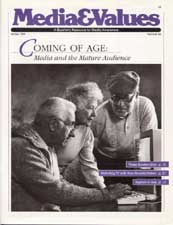How to Watch Television with Your Grandchildren
|
This article originally appeared in Issue# 45
|
To older people the world we thought we knew seems to be continually disappearing and electronic media are a large part of the new vistas that continually emerge. In contrast to the relative simplicity of our own childhood, many of us view the media playthings surrounding our grandchildren with awe. VCR cassettes are a long way from crystal radio sets with earphones!
Even more astonishing is our grandchildren's facility with today's hardware and software. My four-year-old grandniece cannot yet read or print her name. But she finds the program listing for Muppet Babies with no difficulty and uses the VCR without a moment's hesitation.
Like many others my age, I have mixed feelings about the proliferation of media in my grandchildren's lives. On the one hand, I burst with pride, admiration and even envy when I see how easily they master the equipment. At the same time I join many other grandparents (and parents as well) in questioning the impact of so much media on their growth and development.
As we remember the limited playthings of a simpler time, we are more inclined to question the "packaged" options marketed for today's children. I wonder, for example, about the value of my grandson's intense concentration for hours at a time on a computerized video game. I can't help contrasting his motionless absorption in the screen with the active, creative self-initiated hours of my own childhood play.
To me and many of my age group, much of what children hear and see on television and experience with media seems so frenetic and loud! But deeper than that, I worry about the commercialism of so much of today's popular culture, the easy violence of too many plots and, yes, the suggestive words and actions that children quickly imitate long before they can possibly experience the depth of human sexuality
| Try These Tips
|




